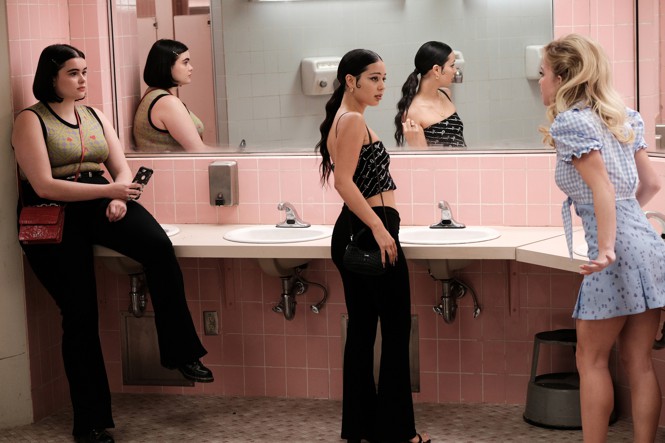This article contains spoilers through the Season 2 finale of Euphoria.
Toward the end of Euphoria’s second-season finale, which aired Sunday, two former best friends, Cassie (played by Sydney Sweeney) and Maddy (Alexa Demie), take a breather after a vicious fight. Cassie’s nose is bleeding; Maddy’s foot needs ice. “Don’t worry,” Maddy says when Cassie breaks the silence with a self-deprecating comment. “This is just the beginning.” She delivers her words with a smile, but they come off as a threat, leaving Cassie looking uncertain. What, exactly, is “beginning”?
Watching Euphoria evokes a similar sense of unease. Loosely based on an Israeli drama of the same name, the graphic HBO series chronicles the lives of a group of high schoolers grappling with addiction, sexual identity, and mental health. Teenagers are regularly shown having sex, using drugs, and carrying out or suffering physical and emotional abuse; many such scenes are depicted in a bold, kaleidoscopic manner. The first season rooted these visual flourishes in the point of view of Rue (played by Zendaya), the 17-year-old protagonist, which resulted in an inventive study of a modern teenager’s colorful inner reality.
Season 2, however, has been fuzzier in its intent, reducing Rue’s role to the degree that her seemingly pivotal partnership with a local drug queenpin wasn’t mentioned at all in the finale. Instead, the show just became violent and explicit in other ways. One character threatened another with a game of Russian roulette; the agonizing scene did little to move the story forward. An extended sex fantasy about Cassie looked like soft-core pornography. The finale killed off a child. Teen dramas can certainly be intense, but Euphoria, with its focus on trauma, operates on a different level—a level that’s more stressful than satisfying to watch.
[Read: The dark teen show that pushes the edge of provocation]
And yet, the series’s second season has been wildly popular. According to HBO, the premiere has garnered nearly 19 million viewers across its platforms since it first aired, an explosive growth of more than two and a half times the number of viewers the first-season premiere has attracted. Meanwhile, off-screen, Euphoria has transformed into a watercooler show for the digital age—the kind of series meant to be not analyzed but repurposed into bite-size pieces made for online consumption. The show became Twitter’s most-tweeted-about series of the decade so far, and every episode yielded a torrent of social-media activity in which viewers aired out their anxiety about the drama—while, at the same time, lamenting their devotion to it. “I am so aggravated by this show,” one TikToker said in a post midway through the season, “and I will watch absolutely every episode.”
I’d been feeling the same way, but I needed until the credits rolled on Sunday to understand why Season 2 kept such a hold on audiences. After all, I’m fairly certain that the creator, Sam Levinson, a notoriously fastidious filmmaker who writes without a writers’ room and directs almost every episode himself, didn’t intend to make a show that would thrive in the form of screenshots. Yet the second season delivered the necessary ingredients for collective processing: The visual flair that made Euphoria stand out overshadowed the writing, the story hopscotched from one salacious vignette to the next, and the rumored behind-the-scenes clashes between Levinson and some cast members amplified the show’s air of confusion and calamity. The series was running on showy performances and shocking moments but little else—which meant that those of us who watched Euphoria weren’t really watching Euphoria; we were rubbernecking.
Take the scene in which several characters converge in a school bathroom and question Cassie’s over-the-top outfit. The camerawork is zippy, each movement choreographed perfectly. The teenage girls can’t stay on topic because they’ve been distracted by their friend’s attire, and Cassie’s breakdown, culminating in her imagined outburst—“I have never ever been happier!”—lands as a twisted punch line. Yet for all its impeccable timing, the entire sequence feels staged and unnatural, too absurd to yield a deeper understanding of Cassie despite Sweeney’s obvious dedication to the role. The scene turns into an impassive collection of jokes about her appearance instead of a drama worth emotionally investing in. No wonder viewers created several meme templates out of it.

Levinson takes a similarly detached approach to the show’s grittier moments. In the same episode, a man finally learns what his son has been keeping from him; simultaneously, a 12-year-old he’s never met before beats him bloody with a gun. The revelations should be crushing, but Levinson plays the violence and the conversation for laughs, training the camera on the rivulets of blood obscuring the man’s eyes and emphasizing his bewilderment. The gore becomes hard to watch, while the tension is rendered inert. At least the lighting looks great.
In other words, Euphoria has become an aimless show—even though it remains a hypnotizing one. In the disarray of Season 2, the series’s sense of nihilism is magnified. Familiar characters, such as Kat (Barbie Ferreira), regressed after making strides in Season 1. Fresh faces disappear after making little impact on the story. Lexi (Maude Apatow) spent the entire season writing a play that narratively and stylistically rehashed the show itself: indulgent, with a wildly impressive budget, but pointless. Rue wraps up the season assuring viewers that she stayed clean through the end of the school year, but doesn’t clarify whether that means she relapsed afterward. Euphoria’s teenagers lead extremely unrealistic lives, yet that feeling of meaningless chaos perhaps rings true for a generation that faces a largely image-driven, digital world, navigating global crises and cynical outlooks on the future. Euphoria taps into the idea that adolescence these days is bleak, so bleak that there’s nothing anyone can do but laugh and walk away. Pity the youth, the show says; they don’t control much, aside from maybe glittery eye makeup.
Then again, Levinson would probably disagree that the show has devolved into aesthetically pleasing social-media fodder for cynics and disaffected teens. “That’s what makes life beautiful,” he argues in a behind-the-scenes interview for HBO. “The messiness and the faux pas and the mistakes.” Beautiful, yes, but according to what’s been happening on Euphoria? Nothing more.



